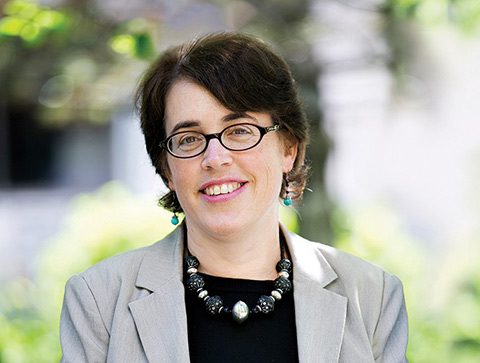“A long emergency.” This is how Heather Johnston describes why Dignitas International was set up in 2004. “[Our co-founders] saw how AIDS was decimating Southern Africa in the 1990s and 2000s, and they, like everyone in the field, could see what a crisis it was – and how there were no quick fixes.”
Johnston (BA 1992 VIC) is the new president and CEO of the Toronto-based organization and the co-founders in question are James Orbinski (MA 1998) and James Fraser (BA 1996, MA 2001).
The fifth generation of her family to attend U of T, Johnston is no newcomer to aid work in Africa. Four weeks before she turned 30, she left a solid desk job at a Toronto-based charity to move to Mali in 1999. “It was grassroots stuff, trying to help address the concerns of groups of Malian people who are blind and deaf.” Johnston later “shifted to a job working on reproductive health rights – of real interest to me, since both my sons were born in Mali during my 13 years there.” (The eldest is adopted; the youngest’s father, Ibrahim Ag Idbaltanat, has won international awards for leading the campaign to curtail slavery in Mali.)
After Mali, Johnston worked on aid and development projects in Ghana, Uganda, Ethiopia, Haiti, Bolivia and Canada. Taking the job at Dignitas has shifted her attention to Malawi, a small, landlocked nation of 16 million in Africa’s southeast. “AIDS was an important public health issue in Mali, but the HIV-prevalence rates never reached the levels they did in Southern Africa,” she says.
Dignitas has, since its founding, administered 1.7 million HIV tests and connected more than 244,000 people with life-saving treatment in Malawi. “We’re rolling out a program [with the country’s Ministry of Health] to help eliminate transmission of HIV from mothers to children,” she says.
Under Johnston, Dignitas has lately been pursuing three goals set by the United Nations, called, informally, 90-90-90: “You want 90 per cent of people living with HIV to know their status, 90 per cent of diagnosed people to receive sustained retroviral treatment and 90 per cent of people on treatment to have viral suppression.” At her fingertips, she has current numbers for one region of Malawi – 79, 77 and 84 per cent, respectively. “That whole region was about to lose an entire generation of people. What the Jameses saw was like a health tsunami or earthquake. It’s much better than it was, but the emergency, it’s not over.”
Recent Posts
People Worry That AI Will Replace Workers. But It Could Make Some More Productive
These scholars say artificial intelligence could help reduce income inequality
A Sentinel for Global Health
AI is promising a better – and faster – way to monitor the world for emerging medical threats
The Age of Deception
AI is generating a disinformation arms race. The window to stop it may be closing





